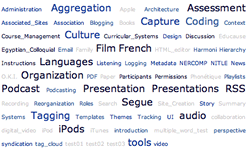Adam Franco and Alex Chapin did a showcase presentation at OpeniWorld last week in New Orleans with the working title of “O.K.I. Open Service Interface Definitions as a Native Framework API“. Held in conjunction with the 2007 Merlot (Multimedia Educational Resource for Learning and Online Teaching) conference, OpeniWorld is a new venue focusing on interoperability standards in education that follows somewhat in the tradition of Alt-i-Lab (Advancing Learning Technology Interoperability), a series of conferences organized by IMS Global Learning Consortium.
The work of the Open Knowledge Initiative (O.K.I.) continues to be central to efforts to define standards by which independent curricular systems can interoperate. Support for this work recently expanded within educational technology when California State University (CSU) committed to using the O.K.I. open service interface definitions (OSIDs) as the means to connect their various curricular systems to their Digital Marketplace initiative. At the same time, the O.K.I. work is extending beyond education. The Institute for Electronic Governance in Hyderabad, India is planning to use the OSIDs to increase interoperability amongst its information systems.
The CSU Digital Marketplace (DMP) is one of the largest initiatives to date to commit to using the OSIDs and should provide excellent real-world applications of these standards. The DMP initiative also involves a diversity of technologies and service providers requiring interoperability between applications developed in different programming environments such as Sakai (writted in Java) and Moodle (written in PHP). The Campus Project at the Open University of Catalonia is another large initiative that is planning to use the OSIDs to integrate Sakai and Moodle. Essentially both initiatives would like to make possible content that can become independent of the tool or system used to create it and tools and systems that can access content from a variety of sources.
Stuart Sim, the CTO of Moodlerooms and an active participant at the conference, emphasized the need to create simple “Hello World” applications that can be a reference for developers who want to begin using the OSIDs. Stuart has been an advocate for Harmoni, our service-oriented application framework that includes implementations of the OSIDs and wants to find ways to use Harmoni to introduce OSIDs into future versions of Moodle.
Scott Morris, a manager of education marketing at Apple, was another key participant. Scott showcased the Apple Learning Interchange (ALI), a personal content management system and social network for educators, which feels like a cross between the iTunes Music Store and Facebook. Educators can use the site to create projects and media collections that they can collaboratively develop with colleagues and then share using a Creative Commons license. Scott noted how learning management systems are being decomposed into smaller, more specialized applications and how students want to use the same tools to access learning material as they use for other content such as iPods, iTunes and iLife, as well as IM, blogs, cell phones and so on.
 I gave a presentation at the
I gave a presentation at the 
 Last month I gave a presentation to a small group of faculty on
Last month I gave a presentation to a small group of faculty on